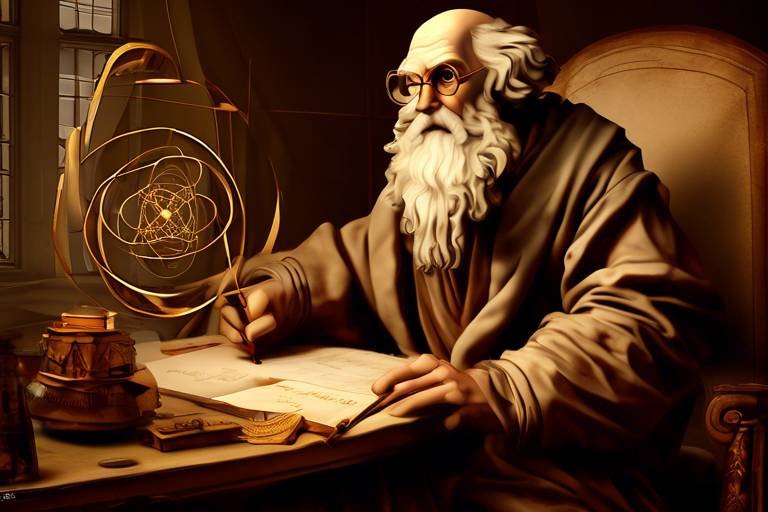Anaximander: The Philosopher of Cosmology
Exploring the life and contributions of Anaximander, an ancient Greek philosopher known for his work in cosmology and the early development of scientific thought in the Western tradition.
Discovering the historical context and upbringing of Anaximander, shedding light on how his early experiences influenced his philosophical perspectives.
Exploring Anaximander's concept of the apeiron or the boundless, and its significance in shaping his cosmological theories.
Examining Anaximander's unique theories on the origin and structure of the universe, including his views on the celestial bodies and natural phenomena.
Discussing Anaximander's cartographic innovations and his impact on early Greek geography, particularly his creation of one of the first known maps.
Analyzing the lasting influence of Anaximander's scientific methodology and his contributions to the development of empirical inquiry in ancient philosophy.
Exploring Anaximander's early ideas on the origins of life and the concept of biological evolution, predating modern evolutionary theories by centuries.
Examining how Anaximander's cosmological concepts and scientific approach continue to inspire modern scientific thought and philosophical inquiry.
Discussing the ongoing scholarly debates and interpretations surrounding Anaximander's work, highlighting the complexities of his philosophical legacy.

Early Life and Background
Exploring the life and contributions of Anaximander, an ancient Greek philosopher known for his work in cosmology and the early development of scientific thought in the Western tradition.
Discovering the historical context and upbringing of Anaximander sheds light on how his early experiences influenced his philosophical perspectives. Born in the ancient city of Miletus, Anaximander was a student of Thales, another prominent pre-Socratic philosopher. Growing up in a bustling cultural hub, Anaximander was exposed to diverse ideas and intellectual discourse from a young age, shaping his inquisitive mind and philosophical inclinations.

Philosophy of the Boundless
Exploring the life and contributions of Anaximander, an ancient Greek philosopher known for his work in cosmology and the early development of scientific thought in the Western tradition.
Discovering the historical context and upbringing of Anaximander, shedding light on how his early experiences influenced his philosophical perspectives.
Anaximander's philosophy was deeply rooted in the concept of the apeiron, or the boundless. This notion of the infinite and undefined served as the cornerstone of his cosmological theories, challenging traditional views of the cosmos. By proposing that the fundamental substance of the universe was boundless and eternal, Anaximander paved the way for a new understanding of the natural world.
Anaximander's cosmological ideas were revolutionary for his time. He believed that the universe was governed by natural laws and principles, rather than by the whims of gods. His theory posited that the earth was cylindrical in shape, suspended in space without any support. This bold assertion challenged prevailing beliefs about the earth's place in the cosmos and laid the foundation for future astronomical discoveries.
In addition to his cosmological theories, Anaximander made significant contributions to the field of geography. He is credited with creating one of the earliest known maps, which depicted the known world at the time. This map not only showcased his cartographic skills but also highlighted his innovative approach to understanding the physical world.
Anaximander's scientific legacy extends far beyond his own time. His emphasis on empirical observation and rational inquiry laid the groundwork for the development of scientific methodology. By advocating for a systematic approach to understanding the natural world, Anaximander paved the way for future scientific advancements.
One of Anaximander's most intriguing ideas was his theory of evolution. Long before the modern concept emerged, he proposed that life originated in the sea and evolved over time into more complex forms. This early notion of biological evolution showcases Anaximander's forward-thinking approach to understanding the diversity of life on earth.
Even in the modern era, Anaximander's ideas continue to resonate with scientists and philosophers alike. His emphasis on the boundless nature of the universe and the importance of empirical evidence still influence contemporary scientific thought. By challenging conventional wisdom and embracing the unknown, Anaximander's legacy lives on in the pursuit of knowledge and understanding.
Despite the passage of centuries, scholars continue to debate and interpret Anaximander's work. The complexities of his philosophical legacy invite a range of interpretations, sparking ongoing discussions about the nature of the cosmos and the role of human inquiry. By delving into the nuances of his ideas, scholars strive to uncover the enduring relevance of Anaximander's contributions to the history of thought.

apeiron
Anaximander's concept of the is a central tenet of his philosophy, representing the boundless or infinite principle from which all things originate and to which they return. This concept of the indefinite and limitless serves as the foundation of Anaximander's cosmological theories, challenging traditional notions of the cosmos and the natural world.
According to Anaximander, the is the source of all existence, existing independently of the elements found in the observable world. It is a primordial substance that encompasses the potential for all forms of being, transcending the finite and the defined. In this sense, the represents an abstract and eternal reality that underlies the diversity and order of the universe.
Furthermore, Anaximander believed that the is in a constant state of flux and transformation, giving rise to the perpetual motion and evolution of the cosmos. This dynamic interplay of opposites within the boundless generates the natural processes and phenomena observed in the world, emphasizing the interconnectedness of all things.
By contemplating the concept of the , Anaximander sought to provide a comprehensive explanation for the origins and structure of the universe, proposing a philosophical framework that transcended traditional mythological narratives. His innovative ideas laid the groundwork for future generations of thinkers to explore the fundamental principles underlying the natural world and the cosmos.

or the boundless, and its significance in shaping his cosmological theories.
Anaximander's concept of the apeiron, or the boundless, played a pivotal role in shaping his cosmological theories. This notion of the boundless represented an infinite and indeterminate substance from which all things originated and to which they returned. Anaximander believed that the boundless was the fundamental principle underlying the cosmos, serving as the source of all existence. In his philosophical framework, the apeiron served as the unifying force that governed the perpetual cycle of creation and destruction in the universe.

Cosmological Ideas
Anaximander's cosmological ideas were groundbreaking in the ancient world, setting the stage for the development of scientific thought. Central to his philosophy was the concept of the apeiron, or the boundless. Anaximander proposed that this boundless, indefinite substance was the source from which all things originated and to which all things would return.
His cosmological theories delved into the nature of the universe, offering a unique perspective on the celestial bodies and natural phenomena. Anaximander believed that the Earth was cylindrical in shape, suspended in space without any support. He also speculated on the existence of multiple worlds, suggesting a vast and complex cosmos beyond human comprehension.
One of the most intriguing aspects of Anaximander's cosmology was his view on the origins of life. He posited that life emerged from a primordial sea or moisture, evolving over time into more complex forms. This early notion of biological evolution was revolutionary for its time, laying the groundwork for future scientific inquiries into the development of life on Earth.
Furthermore, Anaximander's cosmological ideas extended to the concept of eternal motion and cycles in the universe. He proposed that the celestial bodies moved in circular paths, governed by natural laws and principles. This vision of a dynamic and harmonious cosmos reflected his belief in order and balance as fundamental aspects of the natural world.

Geographical Contributions
Anaximander's contributions to the field of geography were groundbreaking, revolutionizing the way ancient Greeks understood the world around them. One of his most notable achievements was the creation of one of the earliest known maps, which depicted the known world at that time. This map, although primitive by today's standards, laid the foundation for future cartographic endeavors and significantly influenced the development of geographical knowledge.
Moreover, Anaximander introduced the concept of the **geocentric model**, which proposed that the Earth was a cylindrical shape at the center of the universe. This idea challenged prevailing beliefs at the time and paved the way for further exploration of the Earth's geography and position in the cosmos.
His geographical contributions extended beyond mere mapmaking; Anaximander's work also involved studying the natural world and its various phenomena. He sought to understand the interconnectedness of different regions and how geographical features influenced climate, biodiversity, and human settlements.

Scientific Legacy
Exploring the life and contributions of Anaximander, an ancient Greek philosopher known for his work in cosmology and the early development of scientific thought in the Western tradition.
Discovering the historical context and upbringing of Anaximander, shedding light on how his early experiences influenced his philosophical perspectives.
Exploring Anaximander's concept of the apeiron or the boundless, and its significance in shaping his cosmological theories.
Examining Anaximander's unique theories on the origin and structure of the universe, including his views on the celestial bodies and natural phenomena.
Discussing Anaximander's cartographic innovations and his impact on early Greek geography, particularly his creation of one of the first known maps.
Analyzing the lasting influence of Anaximander's scientific methodology and his contributions to the development of empirical inquiry in ancient philosophy.
Exploring Anaximander's early ideas on the origins of life and the concept of biological evolution, predating modern evolutionary theories by centuries.
Examining how Anaximander's cosmological concepts and scientific approach continue to inspire modern scientific thought and philosophical inquiry.
Discussing the ongoing scholarly debates and interpretations surrounding Anaximander's work, highlighting the complexities of his philosophical legacy.

Theory of Evolution
Exploring the life and contributions of Anaximander, an ancient Greek philosopher known for his work in cosmology and the early development of scientific thought in the Western tradition.
Discovering the historical context and upbringing of Anaximander, shedding light on how his early experiences influenced his philosophical perspectives.
Exploring Anaximander's concept of the apeiron or the boundless, and its significance in shaping his cosmological theories.
Examining Anaximander's unique theories on the origin and structure of the universe, including his views on the celestial bodies and natural phenomena.
Discussing Anaximander's cartographic innovations and his impact on early Greek geography, particularly his creation of one of the first known maps.
Analyzing the lasting influence of Anaximander's scientific methodology and his contributions to the development of empirical inquiry in ancient philosophy.
Exploring Anaximander's early ideas on the origins of life and the concept of biological evolution, predating modern evolutionary theories by centuries.
Examining how Anaximander's cosmological concepts and scientific approach continue to inspire modern scientific thought and philosophical inquiry.
Discussing the ongoing scholarly debates and interpretations surrounding Anaximander's work, highlighting the complexities of his philosophical legacy.

Contemporary Relevance
As we delve into the contemporary relevance of Anaximander's philosophical and scientific contributions, it becomes evident that his ideas have left a lasting impact on various fields of study. In the realm of cosmology, Anaximander's concept of the apeiron continues to spark discussions and debates among modern physicists and cosmologists. His notion of a boundless and infinite substance from which all things originate resonates with contemporary theories on the nature of the universe.
Furthermore, Anaximander's emphasis on empirical observation and rational inquiry has paved the way for the scientific method as we know it today. His approach to understanding the natural world through systematic observation and logical reasoning laid the foundation for modern scientific inquiry. Scientists and philosophers alike still draw inspiration from Anaximander's methodology, recognizing the value of empirical evidence in shaping our understanding of the world.

Debate and Interpretation
When delving into the realm of Anaximander's philosophical legacy, one cannot escape the labyrinth of debates and interpretations that surround his work. Scholars and thinkers alike have grappled with the complexities of his cosmological ideas and scientific methodology, leading to a myriad of contrasting viewpoints and analyses.
One of the central debates revolves around Anaximander's concept of the apeiron , the boundless substance from which all things originate. Some interpret this as a physical element, while others see it as a metaphysical principle. The ongoing discourse seeks to unravel the true essence of the boundless and its implications for understanding the nature of the universe.
Furthermore, interpretations of Anaximander's cosmological theories vary widely, sparking discussions on the nature of his contributions to early scientific thought. Some view him as a visionary ahead of his time, laying the groundwork for future scientific inquiries. Others critique the gaps in his explanations and question the validity of his hypotheses.
Moreover, the question of Anaximander's influence on subsequent philosophical and scientific developments remains a topic of contention. Some argue for a direct lineage from his ideas to modern scientific theories, highlighting his enduring relevance. Conversely, skeptics challenge the extent of his impact and propose alternative narratives of intellectual history.
In essence, the debate and interpretation surrounding Anaximander's work serve as a testament to the richness and complexity of ancient philosophy. By engaging with the diverse perspectives and conflicting analyses, we gain a deeper appreciation for the enduring legacy of this pioneering thinker.
Frequently Asked Questions
- Who was Anaximander?
Anaximander was an ancient Greek philosopher known for his contributions to cosmology and the early development of scientific thought in the Western tradition.
- What is Anaximander's concept of the boundless?
Anaximander's concept of the boundless, known as the apeiron, refers to an infinite and undefined substance from which all things originate and to which they return.
- What were Anaximander's cosmological ideas?
Anaximander proposed unique theories on the origin and structure of the universe, including the idea that celestial bodies were formed from a primordial substance.
- How did Anaximander contribute to geography?
Anaximander is credited with creating one of the first known maps and making significant advancements in early Greek geography.
- What is Anaximander's scientific legacy?
Anaximander's scientific methodology and early ideas on evolution have had a lasting influence on the development of empirical inquiry in philosophy and science.
- How does Anaximander's work remain relevant today?
Anaximander's cosmological concepts and scientific approach continue to inspire modern scientific thought and philosophical inquiry, sparking ongoing debates and interpretations.


















